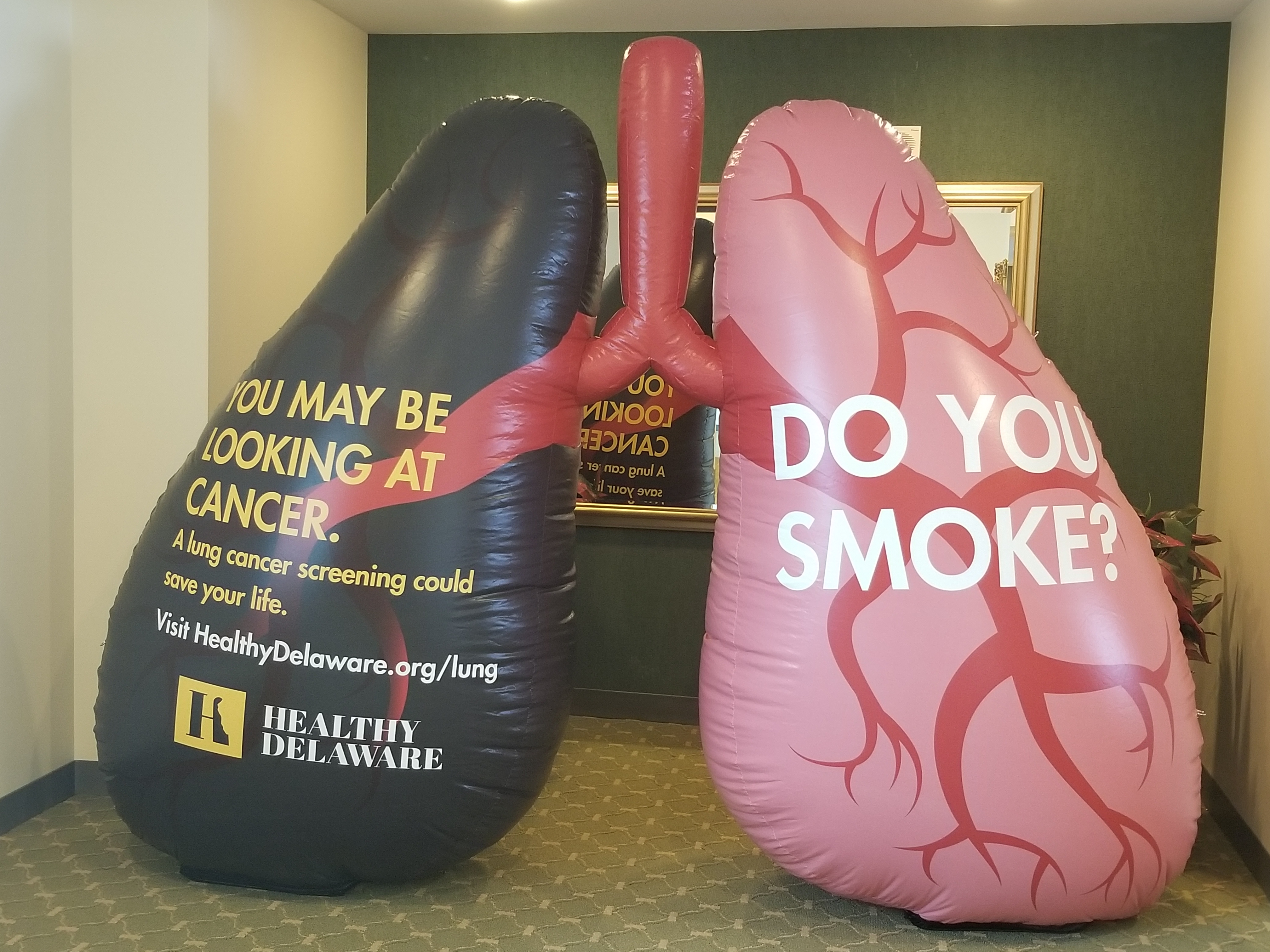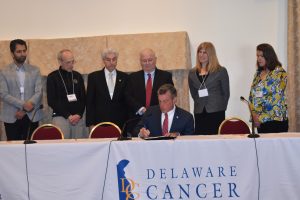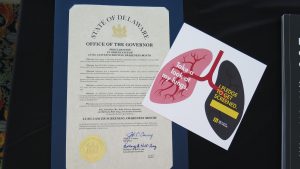DPH Urges Delawareans at High Risk of Lung Cancer to Get Life-Saving Screenings
Delaware Health and Social Services | Division of Public Health | Newsroom | Date Posted: Wednesday, April 17, 2019
Delaware Health and Social Services | Division of Public Health | Newsroom | Date Posted: Wednesday, April 17, 2019

DOVER – Dramatic “before-and-after-smoking” inflatable lungs shared center stage with Governor John Carney as he urged Delawareans at high risk of lung cancer to get life-saving screenings. Governor Carney proclaimed April as Lung Cancer Screening Awareness Month in Delaware at the Delaware Cancer Consortium’s (DCC) annual retreat in Dover on April 16, 2019.
“As many as 113 lives in Delaware can be saved each year with lung cancer screenings,” Governor Carney said. “Delawareans at high risk of lung cancer should get a low-dose computed tomography (CT) scan that can detect lung cancer early, when it is most treatable. It’s painless, noninvasive, takes only 20 minutes, and it could potentially save your life.” A national lung cancer screening trial found that the use of low-dose CT scans to detect lung cancer early can reduce a person’s risk of death from the disease by 20 percent. 
Lung cancer is the most frequently diagnosed cancer in Delaware, with 3,965 cases (14 percent of all newly diagnosed cancer cases) and 2,839 deaths (30 percent of all cancer deaths) between 2010 and 2014, according to the DPH report, Cancer Incidence and Mortality in Delaware, 2010-2014. Smoking is the number one risk factor for lung cancer, with tobacco use causing an estimated 85 percent to 90 percent of all lung cancer cases, according to the U.S. Department of Health and Human Services.
The DCC recommends lung cancer screening for individuals who meet the following criteria:
• Are 55 to 80 years of age
• Smoked a pack of cigarettes a day for the last 30 years or more, or two packs a day for the last 15 years or more
• Quit smoking within the last 15 years and had smoked a pack of cigarettes a day for 30 or more years, or two packs a day for 15 or more years
A new lung cancer screening educational campaign sponsored by the DCC and the Division of Public Health (DPH)’s Comprehensive Cancer Control and Prevention Program promotes low-dose CT scans, the availability of screening sites, and that screenings are covered by insurance or by DPH’s Screening for Life (SFL) program.
“All Delawareans, especially current and former smokers, should talk with their health care provider about getting low-dose CT scans,” said DHSS Secretary Dr. Kara Odom Walker, a board-certified family physician. “Uninsured and underinsured Delawareans at high risk for lung cancer should have their screenings covered by health insurance or Screening for Life.”
“Lung cancer screenings are a powerful opportunity to save lives,” said DPH Director Dr. Karyl Rattay. “We urge health provider teams to connect their patients to these early detection resources without delay.” Providers can access free posters and fact sheets at https://www.healthydelaware.org/Healthcare-Providers/Cancer/Lung.
Governor Carney showcased 8-foot-tall inflatable lungs that will tour Delaware’s three counties and be displayed at high-traffic events, hospitals and schools. One lung is healthy, while the other lung depicts 15 years of cigarette smoking. Officials hope the display will increase awareness about tobacco prevention and cessation and lung cancer screenings. The health education tool satisfies two objectives of the DCC’s Early Detection and Prevention Committee: 1.) Decrease the number of late-stage (distant) lung cancer diagnoses by 20 percent; and 2.) Develop and implement evidence-based education campaigns for the sustainability of cancer screening rates.
“Lung cancer screening and tobacco prevention continue to be our priorities,” said DCC Chair Kathleen Connelly. “We are focusing our efforts on educating smokers and former smokers on the recommended low dose CT scan, keeping youth and young adults tobacco free, and helping people who smoke to quit.” 
Aiding these efforts is the General Assembly’s passage on April 11, 2019, of Senate Bill 25, which raises the legal age to purchase tobacco products from 18 to 21 in Delaware. Governor Carney will sign that legislation the day after the Cancer Consortium’s retreat in his Legislative Hall office surrounded by state officials and advocates.
Many lung cancer cases in Delaware are diagnosed at the distal (or late) stage, making lung cancer the leading cause of cancer deaths (567 deaths per year) in the state, according to the Cancer Incidence and Mortality in Delaware, 2010-2014. In the same period, Delaware had a statistically significantly higher lung cancer incidence rate (70.9 people per 100,000) compared to the U.S. (55.8 people per 100,000). Encouragingly, the gap between U.S. and Delaware lung cancer rates has narrowed over the years, due in large part to statewide reductions in tobacco use that began decades ago.
To schedule a low-dose CT scan, visit https://www.healthydelaware.org/Individuals/Cancer/Lung and call 302-744-1020 to speak with a lung cancer nurse navigator. For more information about DPH’s cancer prevention and control program, visit https://www.dhss.delaware.gov/dhss/dph/dpc/cancer.html or call 302-744-1020. For more information about DPH’s Screening For Life program, visit: https://dhss.delaware.gov/dph/dpc/sfl_eligibility.html.
For more information about the DCC, visit https://www.healthydelaware.org/Consortium.
A person who is deaf, hard-of-hearing, deaf-blind or speech-disabled can call the DPH phone number above by using TTY services. Dial 7-1-1 or 800-232-5460 to type your conversation to a relay operator, who reads your conversation to a hearing person at DPH. The relay operator types the hearing person’s spoken words back to the TTY user. To learn more about TTY availability in Delaware, visit http://delawarerelay.com.
The Delaware Department of Health and Social Services is committed to improving the quality of the lives of Delaware’s citizens by promoting health and well-being, fostering self-sufficiency, and protecting vulnerable populations. DPH, a division of DHSS, urges Delawareans to make healthier choices with the 5-2-1 Almost None campaign: eat 5 or more fruits and vegetables each day, have no more than 2 hours of recreational screen time each day (includes TV, computer, gaming), get 1 or more hours of physical activity each day, and drink almost no sugary beverages.
Keep up to date by receiving a daily digest email, around noon, of current news release posts from state agencies on news.delaware.gov.
Here you can subscribe to future news updates.
Delaware Health and Social Services | Division of Public Health | Newsroom | Date Posted: Wednesday, April 17, 2019

DOVER – Dramatic “before-and-after-smoking” inflatable lungs shared center stage with Governor John Carney as he urged Delawareans at high risk of lung cancer to get life-saving screenings. Governor Carney proclaimed April as Lung Cancer Screening Awareness Month in Delaware at the Delaware Cancer Consortium’s (DCC) annual retreat in Dover on April 16, 2019.
“As many as 113 lives in Delaware can be saved each year with lung cancer screenings,” Governor Carney said. “Delawareans at high risk of lung cancer should get a low-dose computed tomography (CT) scan that can detect lung cancer early, when it is most treatable. It’s painless, noninvasive, takes only 20 minutes, and it could potentially save your life.” A national lung cancer screening trial found that the use of low-dose CT scans to detect lung cancer early can reduce a person’s risk of death from the disease by 20 percent. 
Lung cancer is the most frequently diagnosed cancer in Delaware, with 3,965 cases (14 percent of all newly diagnosed cancer cases) and 2,839 deaths (30 percent of all cancer deaths) between 2010 and 2014, according to the DPH report, Cancer Incidence and Mortality in Delaware, 2010-2014. Smoking is the number one risk factor for lung cancer, with tobacco use causing an estimated 85 percent to 90 percent of all lung cancer cases, according to the U.S. Department of Health and Human Services.
The DCC recommends lung cancer screening for individuals who meet the following criteria:
• Are 55 to 80 years of age
• Smoked a pack of cigarettes a day for the last 30 years or more, or two packs a day for the last 15 years or more
• Quit smoking within the last 15 years and had smoked a pack of cigarettes a day for 30 or more years, or two packs a day for 15 or more years
A new lung cancer screening educational campaign sponsored by the DCC and the Division of Public Health (DPH)’s Comprehensive Cancer Control and Prevention Program promotes low-dose CT scans, the availability of screening sites, and that screenings are covered by insurance or by DPH’s Screening for Life (SFL) program.
“All Delawareans, especially current and former smokers, should talk with their health care provider about getting low-dose CT scans,” said DHSS Secretary Dr. Kara Odom Walker, a board-certified family physician. “Uninsured and underinsured Delawareans at high risk for lung cancer should have their screenings covered by health insurance or Screening for Life.”
“Lung cancer screenings are a powerful opportunity to save lives,” said DPH Director Dr. Karyl Rattay. “We urge health provider teams to connect their patients to these early detection resources without delay.” Providers can access free posters and fact sheets at https://www.healthydelaware.org/Healthcare-Providers/Cancer/Lung.
Governor Carney showcased 8-foot-tall inflatable lungs that will tour Delaware’s three counties and be displayed at high-traffic events, hospitals and schools. One lung is healthy, while the other lung depicts 15 years of cigarette smoking. Officials hope the display will increase awareness about tobacco prevention and cessation and lung cancer screenings. The health education tool satisfies two objectives of the DCC’s Early Detection and Prevention Committee: 1.) Decrease the number of late-stage (distant) lung cancer diagnoses by 20 percent; and 2.) Develop and implement evidence-based education campaigns for the sustainability of cancer screening rates.
“Lung cancer screening and tobacco prevention continue to be our priorities,” said DCC Chair Kathleen Connelly. “We are focusing our efforts on educating smokers and former smokers on the recommended low dose CT scan, keeping youth and young adults tobacco free, and helping people who smoke to quit.” 
Aiding these efforts is the General Assembly’s passage on April 11, 2019, of Senate Bill 25, which raises the legal age to purchase tobacco products from 18 to 21 in Delaware. Governor Carney will sign that legislation the day after the Cancer Consortium’s retreat in his Legislative Hall office surrounded by state officials and advocates.
Many lung cancer cases in Delaware are diagnosed at the distal (or late) stage, making lung cancer the leading cause of cancer deaths (567 deaths per year) in the state, according to the Cancer Incidence and Mortality in Delaware, 2010-2014. In the same period, Delaware had a statistically significantly higher lung cancer incidence rate (70.9 people per 100,000) compared to the U.S. (55.8 people per 100,000). Encouragingly, the gap between U.S. and Delaware lung cancer rates has narrowed over the years, due in large part to statewide reductions in tobacco use that began decades ago.
To schedule a low-dose CT scan, visit https://www.healthydelaware.org/Individuals/Cancer/Lung and call 302-744-1020 to speak with a lung cancer nurse navigator. For more information about DPH’s cancer prevention and control program, visit https://www.dhss.delaware.gov/dhss/dph/dpc/cancer.html or call 302-744-1020. For more information about DPH’s Screening For Life program, visit: https://dhss.delaware.gov/dph/dpc/sfl_eligibility.html.
For more information about the DCC, visit https://www.healthydelaware.org/Consortium.
A person who is deaf, hard-of-hearing, deaf-blind or speech-disabled can call the DPH phone number above by using TTY services. Dial 7-1-1 or 800-232-5460 to type your conversation to a relay operator, who reads your conversation to a hearing person at DPH. The relay operator types the hearing person’s spoken words back to the TTY user. To learn more about TTY availability in Delaware, visit http://delawarerelay.com.
The Delaware Department of Health and Social Services is committed to improving the quality of the lives of Delaware’s citizens by promoting health and well-being, fostering self-sufficiency, and protecting vulnerable populations. DPH, a division of DHSS, urges Delawareans to make healthier choices with the 5-2-1 Almost None campaign: eat 5 or more fruits and vegetables each day, have no more than 2 hours of recreational screen time each day (includes TV, computer, gaming), get 1 or more hours of physical activity each day, and drink almost no sugary beverages.
Keep up to date by receiving a daily digest email, around noon, of current news release posts from state agencies on news.delaware.gov.
Here you can subscribe to future news updates.